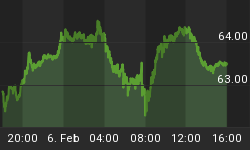B.A.T.S Global Markets Inc.'s President and CEO, Joe Ratterman sat down with Bloomberg Television's Erik Schatzker on "Market Makers" today and said that they aim to list IPOs 6-12 months after deal closes, Direct Edge deal won't reduce exchange competition and NASDAQ outage was unfortunate for the industry. Ratterman also said it is myth that there is a lot of activity happening on the NYSE trading floor and trading being down one-third since its peak in 2009 is the new normal.
Ratterman on why Direct Edge decided to merge after years of hesitation:
"This time it has a lot to do with the final configuration and what was important to us was to have the shareholders behind Direct Edge, behind the combined effort. In the past, there was not as much discussion about how they would join around the table, and this time it is how they wanted to go, so we were able to join Goldman, and Knight along with existing shareholders."
On whether the merger reduces competition:
"We do not think it is reducing competition by any stretch. These are innovative firms focused on customers, and the larger scale will help us compete more than we have in the past. We believe this is a competitive play that will accrue to our customers... Scale will be passed onto customers. We are already efficient, but when we are together, will be more efficient in terms of pricing, innovation and focus."
On what B.A.T.S can do now that they were not able to do as an independent company:
"The size we were independently, the market data offering did not have the perception of depth as the NASDAQ or the New York Stock Exchange depth. They would not go to either B.A.T.S. or Direct Edge, but together, we will have the same scale and we could offer better products in those areas...We might consider coming back into listings. That might make more sense for us then, the continued innovation of the way we position these markets, we will put more emphasis there."
On why not do listings now:
"We have the relative liquidity provider program on the B.A.T.S for ETFs and we are pulling that model out in the ETF issuers are excited about what they are seeing with that model. We are already in that business, and just focused on getting approval, which is not guaranteed, we assume it will be because it is a great deal for customers, and then affecting technology migration. Those are out priorities."
On how long it be before B.A.T.S makes decision to get into common stock:
"We are hoping for a first half of the year approval. After that, we would expect six to twelve months. We want to be completely seamless."
On how much success will depend on taking business away from NASDAQ and NYSE:
"Our success is not at the expense of anyone else. Customers have found value in liquidity pools B.A.T.S and Direct Edge have operated... If they are not paying attention to their customers as good as we are, we would expect to gain market share, but it is not focused on getting market share from them, but getting earnings to our customers."
On whether NASDAQ has become more vulnerable after last week's outage:
"I do not want to comment on that. The deal has been in the works. The last outage was unfortunate for the industry, but this deal stands on its own, whether or not competitors are having issues... I think the markets are quite easily and resilient. We did have an issue that had the exchanges have to back away from trading, but they came back up. It was not a normal close. Trading came back up again on Friday. It has been a lot of highlighting the issues that have happened, but I believe the resiliency is there and for the most part, day in and day out, to issue in one particular location are not felt everywhere else and trading continues 99% of the time."
On whether trading being down one-third from the 2009 peak level is the new normal:
"I think that is the new normal. There are emphasis between 2007 and 2009 that had the markets rising, and those have played themselves out and today, where people are placing their risks and their bets. As far as we are concerned, we are forecasting where we are and moving forward, and if there is a rise over time, it would be nice, but we are not counting on it."
On whether the floor of the NYSE will be gone in five years:
"Clearing, most trading is done in an automated fashion. It is an icon for the United States, and I believe there is a reason for it to be there, but the myth is there is a lot of activity happening on the floor, while the reality is most of the trading is online these days."















